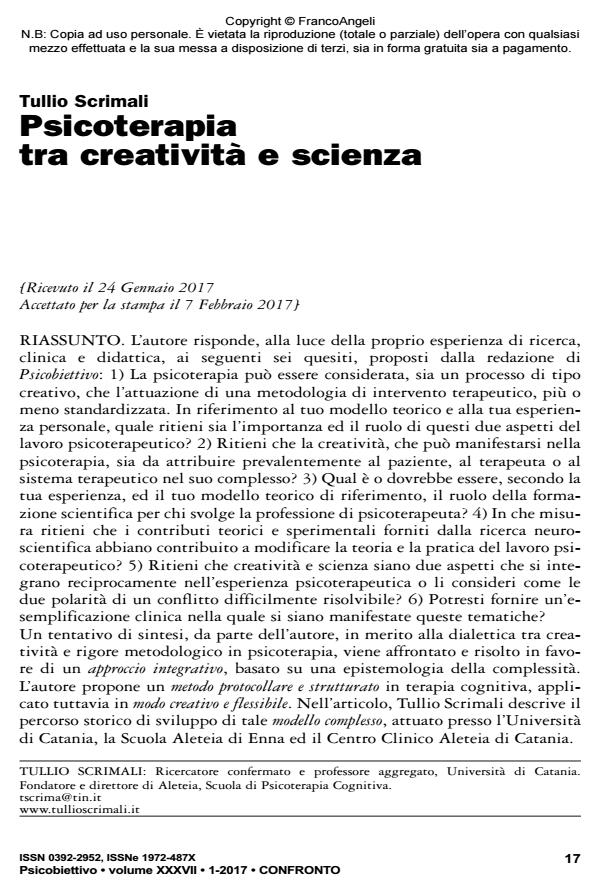Psicoterapia tra creatività e scienza
Titolo Rivista PSICOBIETTIVO
Autori/Curatori Tullio Scrimali
Anno di pubblicazione 2017 Fascicolo 2017/1
Lingua Italiano Numero pagine 20 P. 17-36 Dimensione file 729 KB
DOI 10.3280/PSOB2017-001002
Il DOI è il codice a barre della proprietà intellettuale: per saperne di più
clicca qui
Qui sotto puoi vedere in anteprima la prima pagina di questo articolo.
Se questo articolo ti interessa, lo puoi acquistare (e scaricare in formato pdf) seguendo le facili indicazioni per acquistare il download credit. Acquista Download Credits per scaricare questo Articolo in formato PDF

FrancoAngeli è membro della Publishers International Linking Association, Inc (PILA), associazione indipendente e non profit per facilitare (attraverso i servizi tecnologici implementati da CrossRef.org) l’accesso degli studiosi ai contenuti digitali nelle pubblicazioni professionali e scientifiche.
L’autore risponde, alla luce della proprio esperienza di ricerca, clinica e didattica, ai seguenti sei quesiti, proposti dalla redazione di Psicobiettivo: 1) La psicoterapia può essere considerata, sia un processo di tipo creativo, che l’attuazione di una metodologia di intervento terapeutico, più o meno standardizzata. In riferimento al tuo modello teorico e alla tua esperienza personale, quale ritieni sia l’importanza ed il ruolo di questi due aspetti del lavoro psicoterapeutico? 2) Ritieni che la creatività, che può manifestarsi nella psicoterapia, sia da attribuire prevalentemente al paziente, al terapeuta o al sistema terapeutico nel suo complesso? 3) Qual è o dovrebbe essere, secondo la tua esperienza, ed il tuo modello teorico di riferimento, il ruolo della formazione scientifica per chi svolge la professione di psicoterapeuta? 4) In che misura ritieni che i contributi teorici e sperimentali forniti dalla ricerca neuroscientifica abbiano contribuito a modificare la teoria e la pratica del lavoro psicoterapeutico? 5) Ritieni che creatività e scienza siano due aspetti che si integrano reciprocamente nell’esperienza psicoterapeutica o li consideri come le due polarità di un conflitto difficilmente risolvibile? 6) Potresti fornire un’esemplificazione clinica nella quale si siano manifestate queste tematiche? Un tentativo di sintesi, da parte dell’autore, in merito alla dialettica tra creatività e rigore metodologico in psicoterapia, viene affrontato e risolto in favore di un approccio integrativo, basato su una epistemologia della complessità. L’autore propone un metodo protocollare e strutturato in terapia cognitiva, applicato tuttavia in modo creativo e flessibile. Nell’articolo, Tullio Scrimali descrive il percorso storico di sviluppo di tale modello complesso, attuato presso l’Università di Catania, la Scuola Aleteia di Enna ed il Centro Clinico Aleteia di Catania.
Parole chiave:Psicoterapia; terapia cognitiva complessa; procotocolli terapeutici; neuroscienze; complessità.
Tullio Scrimali, Psicoterapia tra creatività e scienza in "PSICOBIETTIVO" 1/2017, pp 17-36, DOI: 10.3280/PSOB2017-001002